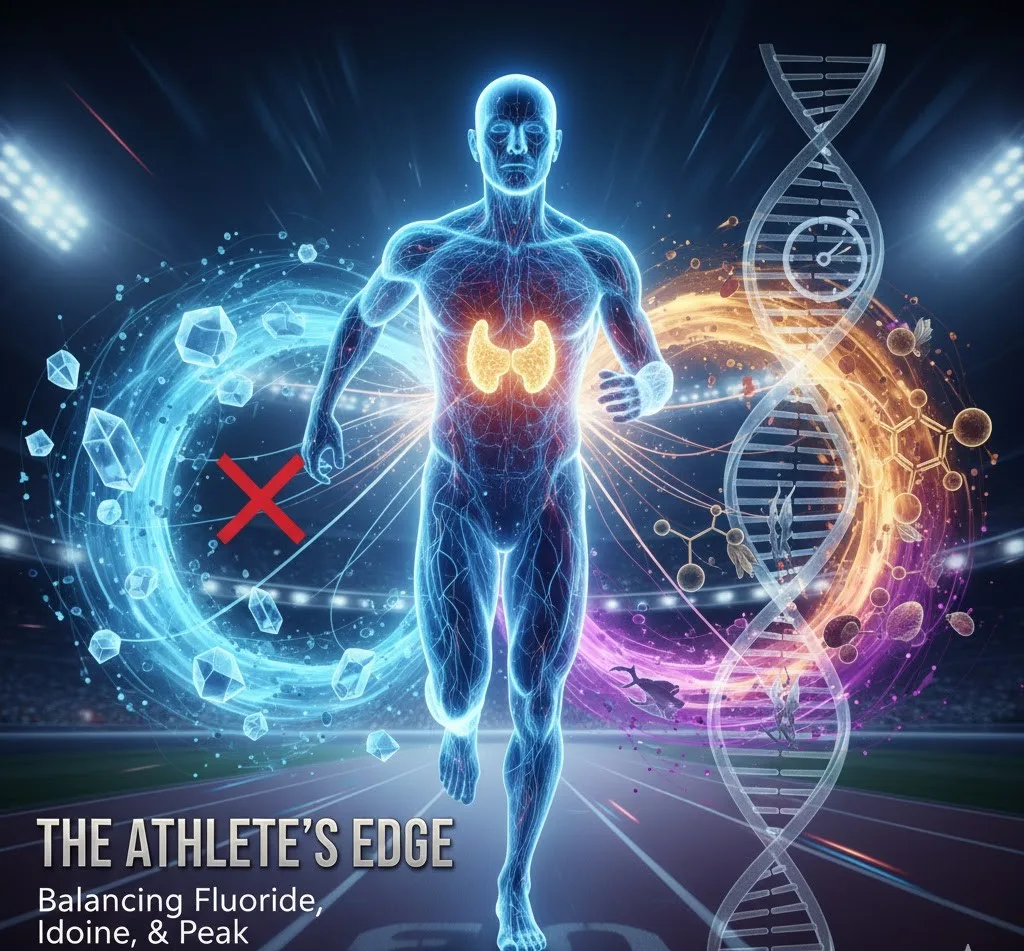For elite athletes, the pursuit of marginal gains requires meticulous attention to every aspect of health, from biomechanics to micronutrient status. While the benefits of topical fluoride for preventing dental decay are well-established—a critical consideration given the high incidence of oral health issues among athletes—a growing body of research suggests a need for a more nuanced approach to systemic exposure to both fluoride and iodine, particularly where it intersects with thyroid function and, ultimately, performance.
Topical vs. Systemic Fluoride: A Different Risk Profile
Fluoride is widely used in sports dentistry to combat high rates of dental issues (such as caries and erosion) often linked to frequent consumption of acidic sports drinks and energy gels, coupled with reduced salivary flow from intense training.
-
Topical Benefit: Fluoride in toothpaste and gels is essential for remineralizing enamel and protecting teeth locally.
-
Systemic Concern: The concern arises with chronic systemic exposure—fluoride absorbed into the body primarily through drinking water and accumulating in bones and soft tissues. This has prompted major scientific bodies to advocate for a review of safe exposure standards, not just to prevent conditions like skeletal fluorosis, but due to its classification as a potential endocrine disruptor.
For athletes, who often consume significantly higher volumes of water than the general population to maintain hydration, the total daily intake of fluoride from water can be substantially increased. This raises critical questions about risk management for a population already pushing their physiological limits.
The Thyroid Connection: Iodine, Fluoride, and Energy
The thyroid gland acts as the body’s master regulator of metabolism and energy production, factors central to athletic performance. This regulation is dependent on a consistent supply of iodine.
Iodine Depletion in Athletes
Athletes engaging in prolonged, high-intensity exercise—especially in hot or humid environments—face a heightened risk of iodine deficiency.
-
Loss through Sweat: Significant amounts of iodine can be lost through sweat, potentially equaling or even exceeding the daily intake recommendations.
-
Performance Impact: Hypothyroidism, a condition caused by inadequate thyroid hormone (T3 and T4) production (often linked to iodine deficiency), is characterized by fatigue, low stamina, muscle weakness, and impaired energy utilization—all factors that can dramatically compromise training capacity and competition results.
The Fluoride-Iodine Interaction
Population studies have shown that in areas where iodine deficiency is prevalent, higher systemic fluoride exposure is statistically associated with a higher incidence of hypothyroidism. While this does not prove a direct causal link, it acts as a "signal" suggesting that fluoride may interfere with iodine uptake or thyroid function, particularly when iodine reserves are already low.
For an athlete, the combination of high iodine loss through sweat and potentially elevated systemic fluoride intake through high water consumption could create a metabolic vulnerability that directly hinders performance and recovery.
A Risk Management Strategy for Athletes
The takeaway message for sports dietitians, team physicians, and athletes themselves is not to eliminate beneficial topical fluoride, but to implement a smarter risk management strategy focused on optimizing systemic health:
-
Optimize Iodine Status: Athletes must prioritize adequate iodine intake through diet or supplementation to compensate for losses through sweat and maintain robust thyroid function.
-
Monitor Systemic Exposure: In environments where water has elevated fluoride levels, hydration sources should be considered alongside overall intake to prevent excessive systemic exposure, especially for high-volume consumers.
-
Maintain Topical Care: The critical importance of fluoride toothpaste and professional applications for oral health—a known factor impacting general health and performance—must be strictly maintained.
By acknowledging the potential risks of chronic systemic exposure and ensuring optimal iodine status, athletes can better protect their delicate endocrine balance, securing every possible advantage in their relentless pursuit of peak performance.

